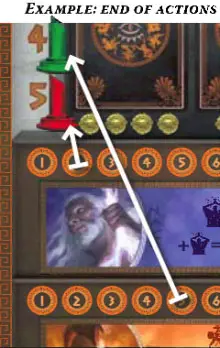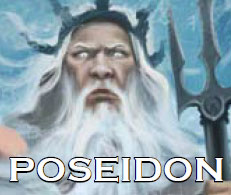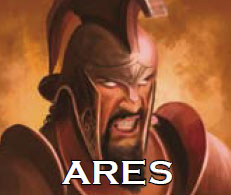A. Call one or more Mythological Creatures

By paying the cost indicated under the card (2, 3 or 4 GP minus any cost reductions due to Temples) the player can take the corresponding Creature card and apply the indicated effect.
Once the power is used, the card is placed face-up in the discard pile.
The powers of the Creatures must be used immediately. A player cannot keep a Creature he just bought in order to use it later. The power of each Creature and the use of the 5 Creature figurines are explained on the 4-page reference booklet contained in the box.
It is important to note that new Creature cards are only placed on the board at the beginning of each cycle. So it's the player who made the best offering to the first God who will get to help himself first. And since there's nothing stopping him from playing multiple Creatures, it is quite possible that the last few players of the cycle will no longer have any Creatures available to them by the time their turn comes around.
B. Recruit
The main Gods allow players to recruit, depending on their specialty, a Troop, a Fleet, a Priest or a Philosopher for free, but also to get more in exchange for precious gold pieces (GP).

Poseidon (Recruit Fleets)
Poseidon offers a free Fleet. It is possible to purchase extra Fleets, as follows:
- The second Fleet costs 1 GP
- The third one 2 GP
- The fourth one 3 GP
A player cannot purchase more than 3 extra Fleets in any given turn.
No player may have more than 8 Fleets. Fleets must be built on sea spaces around an isle belonging to the player. This space must either be empty or contain Fleets belonging to that same player.

Ares (Recruit Troops)
Ares offers a free Troop. It is possible to purchase extra Troops, as follows:
- The second Troop costs 2 GP
- The third one 3 GP
- The fourth one 4 GP
A player cannot purchase more than 3 extra Troops in any given turn.
No player can have more than 8 Troops. Troops must be placed on isles controlled by the player.

Zeus (Recruit Priests)
Zeus offers a free Priest. It is possible to get a single extra Priest for 4 GP.
Priests must be placed in front of the screen, in plain sight.
Effect of Priests
Each Priest reduces the offering to be paid by 1 GP at the beginning of each cycle.
No matter how many Priests a player has, that player MUST pay at least 1 GP for his offering (only the access to Apollo is completely free).

Athena (Recruit Philosophers)
Athena offers a free Philosopher.
It is possible to get a single extra Philosopher for 4 GP.
Philosophers must be placed in front of the screen, in plain sight.
Effect of Philosophers
As soon as a player gets a 4th Philosopher, he must immediately discard them to create a Metropolis.
C. Build
A specific type of building is associated to each God, each building with a different effect. During his turn, a player may build the same sort of building multiple times, including on the same isle, so long as he can afford the cost of 2 GP.
As soon as a player owns 4 different buildings, whether on one or many isles, he automatically creates a Metropolis.

Poseidon (Port)
Effect: the Port gives a defensive bonus during seafaring battles occuring on squares adjacent to this isle.

Ares (Fortress)
Effect: during battles, the Fortress gives a defensive bonus to Troops present on this isle.

Zeus (Temple)
Effect: each Temple reduces the cost of buying a Mythological Creature by 1 GP. The price reduction of each Temple can only be used once per cycle. No matter how many Temples a player owns, he must still spend at least 1 GP to get a Creature.

Athena (University)
Effect: the University has no special effect... but it is one of the 4 buildings you will need to create a Metropolis.
D. Special action
Some Gods grant you special actions. During his turn, a player may perform these actions multiple times, as long as he has enough GP to afford them.

Poseidon (Move Fleets)
For 1 GP, the player may move Fleets currently on the same sea space and move them a maximum of 3 spaces. He can add or abandon Fleets during that movement.
If Fleets enter a space occupied by enemy Fleets, their movement ends and a naval battle begins immediately.


Ares (Move Troops)
For 1 GP, the player may move some or all Troops on an isle to another isle connected by a chain of Fleets of his color.
- If he lands on an isle where enemy Troops are present, a battle starts immediately.
- If he lands on an isle where there are no Troops, he claims this isle without a battle, even if the isle has a Fortress.
- If his Troops leave their starting isle empty, he must leave a territory marker there. This isle belongs to him as long as no opponent lands there. (An isle owned by a player can therefore never become neutral again).
>Last isle: a player may NOT attack the last isle of another player, unless he can prove that he would win the game were he to sucessfully conquer the isle.

Zeus (Change the Creatures)
For 1 GP, the player can discard an available Creature card and replace it with the first card of the draw pile.
This action can be used to get rid of a dangerous Creature at a lesser cost or "seek" a specific Creature the player may need.

E. Increase revenue (Apollo)
Finally, the player(s) who have chosen Apollo will play last and have a very limited choice of actions. Playing Apollo is technically a way to skip one's turn to save money.
The player who has chosen Apollo gets:
- 1 GP if he owns more than one isle
- or 4 GP if he owns a single isle.
The GP thus won are placed behind his screen.
Moreover, he takes one prosperity marker which he places on the isle of his choice (this isle, blessed by Apollo, will earn 1 extra GP at the beginning of every subsequent cycle).
A same island can contain several prosperity markers.
Important: if more than one player has chosen Apollo during a single cycle round, all earn the extra GP, but only the first player to have chosen Apollo will get a prosperity marker.
Apollo does not offer any other actions.
Continue Reading

